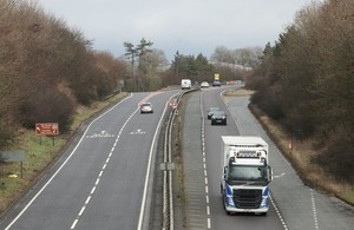The Department for Transport’s (DfT) top civil servant has allowed National Highways’ flagship A66 scheme to proceed, despite cost increases causing it to be assessed as poor value for money.
The A66 Northern Trans-Pennine scheme aims to dual the remaining single carriageway sections of the road between Scotch Corner and Penrith.
In a statement issued in order to comply with HM Treasury guidance, the DfT disclosed that at stage 3 in National Highways’ project control framework, the cost of the project has increased, ‘following further design development and stakeholder consultation to produce a consentable scheme’.
It added that this increase has had a material impact on the scheme’s value for money (VfM) assessment, with an updated adjusted benefit-cost ratio for the scheme (BCR) of 0.90, meaning that it will cost more to build than the benefits it will provide.
When National Highways put the scheme forward for a development consent order in July, the government-owned company described it as a ‘£1bn project'. Earlier this month, it announced that ‘four contractors have put pen to paper to collectively deliver the £1.3bn A66 Northern Trans-Pennine project’.

The statement was issued by Bernadette Kelly, permanent secretary at the DfT and its principal accounting officer, Department for Transport and National Highways chief executive and accounting officer Nick Harris.
It explains that the resulting shortfall in allocated funding ‘is expected in part to be met by drawing on headroom elsewhere in the RIS2 portfolio’, adding that the scheme will also be prioritised within plans for RIS3.
The A66 scheme is part of Project Speed, which the DfT said provides insight into how government major construction schemes can be delivered faster, realising benefits sooner.
In order to justify continuing the scheme despite it being assessed as poor value for money, the statement stresses the strategic case, including:
- its ability to provide freight connectivity, and
- underwrite strategic, regional and national business connectivity
- contribute to levelling-up and economic growth in the north
- provide access to major national tourism areas
- act as an enabler for the Government’s energy security strategy.
It adds: ‘The lessons from acceleration form a key part of the strategic case for the A66. Through early delivery, the improvements in journey time, journey reliability, route resilience and general connectivity will feed through to businesses quicker. This will bring earlier productivity gains and will support economic recovery.’
A quartet of companies have teamed up to win the contract to deliver the work.
Balfour Beatty, Costain, Kier and Keltbray signed an enterprise-wide collaborative working agreement for the Northern Trans-Pennine Project.
The Government has designated the A66 as a ‘Project Speed pathfinder’, which means that construction will have to be dramatically accelerated to meet the opening date of 2029.





